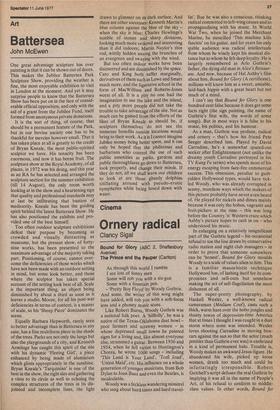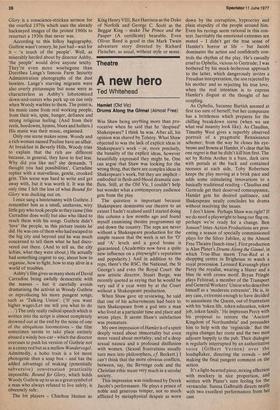Cinema
Ornery radical
Clancy Sigel
Bound for Glory (ABC 2, Shaftesbury Avenue) The Prince and the Pauper (Canton) As through this world I ramble I see lots of funny men Some will rob you with a six-gun Some with a fountain pen.
— 'Pretty Boy Floyd' by Woody Guthrie. And some, the writer of this song might have added, will rob you with a soft-focus lens and a phoney music score.
Like Robert Burns, Woody Guthrie was a national folk poet. A 'hillbilly', he was a native of the Texas-Oklahoma dust bowl — poor farmers and scrawny women — in whose depressed small towns he painted signs for a living and, like almost everyone else, strummed a guitar. Between 1936 and 1954, when he fell victim to Huntington's Chorea, he wrote WOO songs —• including 'This Land is Your Land', 'Toni Joad', 'Union Maid', etc. His influence on a whole generation of younger musicians, from Bob Dylan to Joan Baez and even the Beatles, is incalculable.
Woody was a feckless wandering minstrel who sang about hard times and hard travel lin'. Bue he was also a conscious, thinking radical committed to left-wing causes and to propagandising with his music. In World War Two, when he joined the Merchant Marine, he stencilled 'This machine kills fascists' on his guitar, and for years his only stable audience was radical intellectuals from whom he wisely kept his musical distance but to whom he felt deep loyalty. He is largerly remembered as Arlo Guthrie's father, the dying old man in Alice's Restaurant. And now, because of Hal Ashby's film about him;Bound for Glory (A certificate), millions will know him as a sweet, amiable, laid-back hippie with a great heart but not much of a mind.
I can't say that Bound for Glory is one hundred cent false because it does get some facts right (the sign painting, the name of Guthrie's first wife, the words of some songs). But in most ways it is false to his music, his politics, and his humour.
As a man, Guthrie was profane, radical and ornery — that's how his friend Pete Seeger described him. Played by David Carradine, he's a somewhat spaced-out seeker after Enlightenment (not unlike the dreamy youth Carradine portrayed in his TV Kung Fu series) who spends most of his energy escaping from Aire-fire commercial success. This obsession, peculiar to guiltridden Hollywood types, would have tickled Woody, who was already corrupted in seamy, mundane ways which the makers of this picture probably have never even heard of. He played for nickels and dimes mainly because it was only the hobos, vagrants and fruit-pickers at the time — this was long before the Country. 'n' Western craze which Ashby's picture hopes to cash in on — who understood his music.
In enlarging on a relatively insignificant part of the Guthrie legend — his occasional refusal to toe the line drawn by conservative radio station and night club managers — in order to prove that someone somewhere can be 'honest', Bound for Glory moulds Woody to a scale of values alien to him. This is a familiar masochistic technique Hollywood has, of lashing itself for its compromises and sell-outs but somehow making the act of self-flagellation the most dishonest of all.
The super-pretty photography, by Haskell Wexler, a well-known radical cameraman (Medium Cool), casts such a thick, warm haze over the hobo jungles and shanty towns of depression-time America that at times I thought I was caught in a dust
storm where none was intended. Wexler loves shooting Carradine in moving box cars against the sun so that the actor (much prettier than Guthrie ever was) is enshrined in a kind of permanent halo. Trouble is, Woody makes an awkward Jesus-figure. He abandoned his wife, picked up loose women, drank too much and could be infuriatingly irresponsible. Robert
Getchell's script defuses the real Guthrie by implying it was all in the name of People's Art, of his refusal to conform to middleclass values. In other words, Bound for Glory is a conscience-stricken sermon for the overfed 1970s which uses the already hackneyed images of the protest 1960s to resurrect a 1930s that never was.
According to this folksy hagiography, Guthrie wasn't ornery, he just had for it — 'a touch of the people'. Well, as miserably herded about by director Ashby, 'the people' would drive anyone tetchy.
They're even more woebegone than Dorothea Lange's famous Farm Security Administration photographs of the dust bowlers. Lange's starving migrants were also overly picturesque but none were as -characterless as Ashby's lobotomised down-and-outers who perk up on cue only when Woody warbles to them. The point is, his music came from real working people, from their wit, spite, hunger, defiance and strong religious feeling. (And from their reels, hoedowns, hymns, blues and hollers.) His music was their music, organised.
Only one scene makes sense. Woody and a rich woman named Pauline have an affair.
At breakfast in Beverly Hills, Woody tries
to explain that the rich are different because, in general, they have to feel less.
Why did you like me? she demands. 'I thought you had possibilities', Carradine replies with a marvellous, gentle, crooked
grin. This scene was hard to write and get away with, but it was worth it. It was the only time I felt the loss of what Bound for Glory was ducking out on.
I once sang a hootenanny with Guthrie. I remember him as a small, unshaven, wiry little guy who took people as they came (this Carradine does well) but also who liked to reach them with his songs. Guthrie didn't 'love' the people, as this picture insists he did. He was one of them who had escaped to the big city and beyond and he was much concerned to tell them what he had disco vered out there. (And to tell us, the city lefties, what they were about.) He actually had something cogent to say, about how to organise, how to fight, how to stay alive in a world of troubles.
Ashby's film gives us many shots of David Carradine being awfully democratic with the masses — but it carefully avoids dramatising the activist in Woody Guthrie or reproducing his more pungent songs, such as 'Talking Union'. Of you want higher wages/Let me tell you what to do . . .') The only really radical speech which is written into the script is almost completely drowned out at the end by the noise of one of the ubiquitous locomotives — the film sometimes seems to take place entirely aboard a windy box-car —which the director overuses to push his version of Guthrie not
as a canny red but as a mellow Wandervogel.
Admittedly, a hobo train is a lot more photogenic than a soap box — and has the added advantage of making (potentially
subversive) conversation practically impossible. Bound for Glory, which holds
Woody Guthrie up to us as a great symbol of a man who always refused to live safely, is obscenely safe.
The bit players — Charlton Heston as
King Henry VIII, Rex Harrison as the Duke of Norfolk and George C. Scott as the Beggar King — make The Prince and the Pauper (A certificate) bearable. Even Oliver Reed is good in this Mark Twain adventure story directed by Richard Fleischer, as usual, without style or sense.



































 Previous page
Previous page